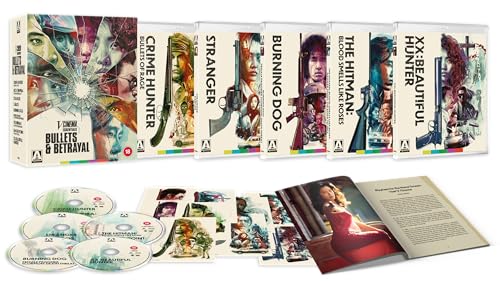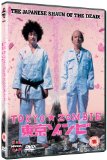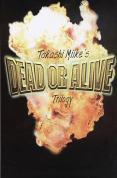 V-Cinema Essentials: Bullets & Betrayal Limited Edition Blu-ray | Blu Ray | (28/04/2025)
from £47.98
| Saving you £N/A (N/A%)
| RRP
V-Cinema Essentials: Bullets & Betrayal Limited Edition Blu-ray | Blu Ray | (28/04/2025)
from £47.98
| Saving you £N/A (N/A%)
| RRP In 1989, legendary Japanese studio Toei launched their V-Cinema line of direct-to-video genre features. V-Cinema Essentials: Bullets & Betrayal presents nine explosive titles representing some of the best the Japanese crime film has to offer.Fast-paced and action-packed, Crime Hunter: Bullets of Rage sees detective Joe Kawamura out for revenge against the men who gunned down his partner. Along the way he teams up with Lily, a gun-toting nun looking to get back five million dollars that was stolen from her church. Next up, Neo Chinpira: Zoom Goes the Bullet sees wannabe yakuza Junko get more than he bargained for when tasked with avenging the murder of a fellow gang member, or face the consequences for betrayal. Meanwhile, in Shunichi Nagasaki's unbearably tense thriller Stranger, a late-night taxi driver is stalked by the unseen driver of an SUV, who just might have a connection to the taxi driver's criminal past. In Carlos, the eponymous Brazilian-Japanese petty criminal sees an opportunity to play rival yakuza gangs against each other, but bites off much more than he can chew. Burning Dog is a gripping heist film where a gang of thieves plot to rob a US military base in Okinawa, but rising tensions in the group threaten to put the plan in jeopardy.Filled with action, thrills and double-crosses, V-Cinema Essentials: Bullets & Betrayal is an electrifying compendium of gems from the Japanese video underworld.LIMITED EDITION CONTENTS¢ High Definition (1080p) Blu-ray presentations of all films ¢ Original lossless Japanese mono audio on Crime Hunter: Bullets of Rage and original lossless Japanese stereo audio for all other films ¢ Optional newly translated English subtitles for all films ¢ Nine postcard-sized artcards ¢ Limited edition packaging with reversible sleeves featuring newly commissioned artwork by Chris Malbon ¢ Illustrated collector's booklet featuring new writing by Earl Jackson, Daisuke Miyao, and Hayley ScanlonDISC 1 CRIME HUNTER: BULLETS OF RAGE / NEO CHINPIRA: ZOOM GOES THE BULLET¢ Newly filmed introductions to both films by Japanese film critic Masaki Tanioka ¢ Loose Cannon, a newly filmed interview with Crime Hunter: Bullets of Rage director Shundo Okawa ¢ Zooming Out, a newly filmed interview with Neo Chinpira: Zoom Goes the Bullet writer-director Banmei Takahashi ¢ Crime Hunter and the Dawn of V-Cinema, a brand new video essay on Crime Hunter: Bullets of Rage by Japanese cinema expert Tom Mes ¢ Original trailers for both filmsDISC 2 STRANGER / CARLOS¢ Newly filmed introductions to both films by Japanese film critic Masaki Tanioka ¢ Stranger than Fiction, a newly filmed interview with Stranger writer-director Shunichi Nagasaki ¢ From Manga to Movies, a newly filmed interview with Carlos writer-director Kazuhiro Kiuchi ¢ An Extra Round in the Chamber, a brand new video essay on Carlos by critic and Japanese cinema expert Jonathan ClementsDISC 3 BURNING DOG / FEMALE PRISONER SCORPION: DEATH THREAT¢ Newly filmed introductions to both films by Japanese film critic Masaki Tanioka ¢ Fire and Ice, a brand new video essay on Burning Dog by critic and Japanese cinema expert Mark Schilling ¢ Toshiharu Ikeda's Beautiful Monster of Vengeance, a brand new video essay on Female Prisoner Scorpion: Death Threat by film historian Samm Deighan ¢ Original trailers for both filmsDISC 4 THE HITMAN: BLOOD SMELLS LIKE ROSES / DANGER POINT: THE ROAD TO HELL¢ Newly filmed introductions to both films by Japanese film critic Masaki Tanioka ¢ The Versatility of Teruo Ishii, a brand new video essay on The Hitman: Blood Smells Like Roses and its director Teruo Ishii by Japanese cinema expert Frankie Balboa ¢ The Road to V-Cinema, a brand new video essay on Danger Point: The Road to Hell by critic and Japanese cinema expert James Balmont¢ Original trailer for The Hitman: Blood Smells Like RosesDISC 5 XX: BEAUTIFUL HUNTER¢ Newly filmed introduction by Japanese film critic Masaki Tanioka ¢ The Sacred and the Profane, a newly filmed interview with screenwriter Hiroshi Takahashi ¢ They Brought Back the Sleaze, a brand new video essay on XX: Beautiful Hunter by critic and Japanese cinema expert Patrick Macias ¢ Original trailer
![The Eel [Blu-ray] [Region A & B]](/pictures/1167693.jpg) The Eel | Blu Ray | (24/03/2025)
from £17.98
| Saving you £N/A (N/A%)
| RRP
The Eel | Blu Ray | (24/03/2025)
from £17.98
| Saving you £N/A (N/A%)
| RRP LIMITED EDITION BLU-RAY FEATURES High-Definition digital transfer Uncompressed mono PCM audio Interview with critic Tony Rayns (2024) Interview with screenwriter Daisuke Tengan (2024) Visual essay by Tom Mes on the year 1997 as a turning point in Japanese cinema (2024) Trailer Newly improved English subtitle translation Reversible sleeve featuring original and newly commissioned artwork by Time Tomorrow Limited edition booklet featuring a newly translated archival interview with Imamura Limited edition of 3000 copies, presented in full-height Scanavo packaging with removable OBI strip leaving packaging free of certificates and markings
![Black Society Trilogy [Blu-ray]](/pictures/1142211.jpg) Black Society Trilogy | Blu Ray | (16/01/2017)
from £24.98
| Saving you £N/A (N/A%)
| RRP
Black Society Trilogy | Blu Ray | (16/01/2017)
from £24.98
| Saving you £N/A (N/A%)
| RRP After several years spent working almost exclusively in the direct-to-video world of V-cinema in Japan, Takashi Miike announced himself as a world-class filmmaking talent with this trio of thematically-connected, character-centric crime stories about violence, the underworld of Japanese society, families both real and surrogate, and the possibly hopeless task of finding one's place in the world. His first films made specifically for theatrical release, and his first for a major studio, the Black Society Trilogy was the beginning of Miike's mature career as a filmmaker and they remain among the prolific director's finest works. Set in the bustling Kabuki-cho nightlife neighborhood of Tokyo, Shinjuku Triad Society follows a mixed-race cop (Kippei Shiina, Outrage) struggling with private issues while hunting a psychotic criminal (Tomorowo Taguchi, Tetsuo the Iron Man) who traffics in children's organs. Rainy Dog, shot entirely in Taiwan, is about an exiled yakuza (Dead or Alive's Show Aikawa) who finds himself saddled with a son he never knew he had and a price on his head after the Chinese gang he works for decides to turn on him. Ley Lines moves from the countryside to the city and back, as three Japanese youths of Chinese descent (including The Raid 2's Kazuki Kitamura) seek their fortune in Tokyo, only to run afoul of a violent gang boss (Naoto Takenaka, The Happiness of the Katakuris). Three of the most dramatically moving films created by the director, the Black Society Trilogy offers clear proof that Miike's frequent pigeonholing as a specialist in bloody spectacle is only one aspect of his filmmaking career, and taken as a whole, the films are among the finest works ever to deal with the way violence and brutality can unexpectedly destroy even the most innocent of lives. SPECIAL EDITION CONTENTS: High Definition digital transfers of all three films Original uncompressed stereo audio Optional English subtitles for all three films New interview with director Takashi Miike New interview with actor Show Aikawa (Rainy Dog, Ley Lines) New audio commentaries for all three films by Miike biographer Tom Mes Original theatrical trailers for all three films Reversible sleeve featuring original and newly commissioned artwork by Chris Malbon FIRST PRESSING ONLY: Illustrated collector s booklet featuring new writing on the films
 Tokyo Zombie | DVD | (13/10/2008)
from £6.54
| Saving you £11.45 (175.08%)
| RRP
Tokyo Zombie | DVD | (13/10/2008)
from £6.54
| Saving you £11.45 (175.08%)
| RRP Tokyo Zombie
![Dead Or Alive - Final [2002]](/pictures/1067719.jpg) Dead Or Alive - Final | DVD | (28/05/2007)
from £6.98
| Saving you £8.01 (114.76%)
| RRP
Dead Or Alive - Final | DVD | (28/05/2007)
from £6.98
| Saving you £8.01 (114.76%)
| RRP Set in a post apocalyptic Yokohama where the population is kept under rigid control by a half crazed mayor Riki Takeuchi is a hard boiled cop and Show Aikawa a mellowed out drifter that hooks up with a gang of rebels. When the gang kidnap Takeuchi's son the wheels are set in motion that leads to an inevitable showdown.
![Eyes of the Spider / Serpent's Path [DVD]](/pictures/1123505.jpg) Eyes of the Spider / Serpent's Path | DVD | (09/09/2013)
from £N/A
| Saving you £N/A (N/A%)
| RRP
Eyes of the Spider / Serpent's Path | DVD | (09/09/2013)
from £N/A
| Saving you £N/A (N/A%)
| RRP When oddball auteur Kiyoshi Kurosawa received an eccentric offer to make two films in two weeks on a low budget and using the same cast the result was the cinematic equivalent of fraternal twins. Though both Eyes of the Spider and Serpent's Path are gangster films about the desire for revenge and both films feature a protagonist named Nijima played convincingly by Sho Aikawa the two films are completely different in tone and plot. Nonetheless they seem freakishly interlocked in ways that defy the conventionally linear relationship of a sequel as each of these enigmatic absorbing films elucidates and alters our understanding of the other. Eyes of the Spider concerns Nijima (Sho Aikawa) a white-collar worker who one day finds the man responsible for his young daughter's brutal rape and murder. He tortures and interrogates the man who maintains his innocence before killing and burying him. He returns to his ordinary life feeling listless and hollow until he meets an old high school friend who introduces him to his hapless band of hired killers. His skill in the assassination business catches the attention of a bigger crime boss. For reasons that remain opaque Nijima is assigned to investigate his friend which ultimately results in a bloody confrontation. Serpent's Path tells the tale of Miyashita (Teruyuki Kagawa); a former low level yakuza has tracked down his child's killer with help of his friend Nijima (Sho Aikawa) whom he met a year before. They've kidnapped a yakuza member believed responsible for the killing to take out revenge. But vengeance is neither simple nor easy. Another person is soon implicated in the child's death leading the pair farther down a path of revenge and violence. And what darker secret has led Nijima a lowly professor to help Miyashita in this affair.
![Ley Lines [1999]](/pictures/1005667.jpg) Ley Lines | DVD | (28/07/2003)
from £5.99
| Saving you £9.00 (150.25%)
| RRP
Ley Lines | DVD | (28/07/2003)
from £5.99
| Saving you £9.00 (150.25%)
| RRP A troupe of bored small town delinquents travel to Tokyo only to find themselves outclassed by the big city criminals... This brutal exploration of Japan's criminal fraternity displays Miike Takashi's celebrated flare for kinetic action and stylish innovation and should not be missed.
 Onibi - The Fire Within | DVD | (25/07/2005)
from £N/A
| Saving you £N/A (N/A%)
| RRP
Onibi - The Fire Within | DVD | (25/07/2005)
from £N/A
| Saving you £N/A (N/A%)
| RRP Kunihiro (Harada) is glad to be back in the outside world after a stretch in prison. He's even more glad to see his old friend Tanigawa (Aikawa) who is more than keen to welcome him back into the yakuza fold. However tired of the gangster life Kunihiro wants to go straight but finds that many obstacles not least Tanigawa stand in his way...
 Dead Or Alive Trilogy Box Set | DVD | (28/05/2007)
from £N/A
| Saving you £N/A (N/A%)
| RRP
Dead Or Alive Trilogy Box Set | DVD | (28/05/2007)
from £N/A
| Saving you £N/A (N/A%)
| RRP Dead Or Alive (2000): Welcome to Shinjuku - city of darkness and corruption and the setting for this stunning movie by Japanese director Takashi Miike. Here rapid-fire shoot-outs and twisted acts of perverse violence provide the backdrop for a vicious war between the Japanese Yakuza and the Chinese Triads and make for one of the most dizzying and spectacular openings ever committed to film. Ryuichi is a gangster who is driven by a desire for power and the memory of his deprived childhood. His younger brother Toji has just returned from studying in the U.S. Between them they are about to learn some harsh lessons about life on the wrong side of the law. Meanwhile Detective Jojima finds himself drawn deeper into the world of the Yakuza as he continues to make dirty deals he hopes will help raise the money to pay for his daughter's life-saving operation. Uncompromising and fearlessly original Takashi's 'Dead Or Alive' takes a mind-bending journey into the dark and twisted world of ruthless gangsters dealers strippers and hookers... Dead Or Alive 2: Birds (2000): With Dead or Alive the extraordinarily gifted and prolific Miike Takashi created one of the most extreme and visually stunning films of his career. With Dead or Alive 2 he pushes the boundaries further than ever before. When Otamoko (Sho Aikawa) is hired to assassinate a ruthless gangster he is surprised to find a mysterious gunman make the hit before he gets the chance to pull the trigger. Deciding to take the money for the job he failed to complete Otamoko flees the city with Japanese Yakuza and the Chinese Triads hot on his trail. Hiding out on the island where he grew up he runs into the man who killed his target; an old friend named Sawada (Riki Takeuchi). Together they plan to use their shooting skills to rid the earth of evil and set out to hit the gang bosses and drug dealers who make the world a worse place. Dead Or Alive: Final (2002): Set in a post apocalyptic Yokohama where the population is kept under rigid control by a half crazed mayor Riki Takeuchi is a hard boiled cop and Show Aikawa a mellowed out drifter that hooks up with a gang of rebels. When the gang kidnap Takeuchi's son the wheels are set in motion that leads to an inevitable showdown.

Please wait. Loading...
This site uses cookies.
More details in our privacy policy